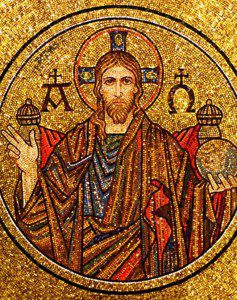 Lectionary Reflections for the last Sunday after Pentecost: The Reign of Christ
Lectionary Reflections for the last Sunday after Pentecost: The Reign of Christ
November 25, 2012
Celebrating Christ the King Sunday seems anachronistic in a pluralistic age, in which many Christians no longer subscribe to imperialistic, supercessionist, or inclusivist theologies which either deny truth and salvation to persons of other faiths or see these faiths as diminished, but possibly salvific, reflections of Christian truth. Is the celebration of Christ’s kingship, or even the less imperialistic realm of Christ, somehow an affront to other religions and barrier to learning from others? Perhaps, this Sunday provides the opportunity for the bold preacher to come out of the closet and declare publically her or his vision of the relationship of Christian truth and salvation to the truths and salvations affirmed in other religious traditions. Our preaching loses vigor when we hide behind platitudes or deny the truths we affirm. Moreover, our congregants assume imperialism and limited salvation unless we share alternative possibilities.
Needless to say, in one way or another, most religious traditions are tempted toward theological or philosophical imperialism. After all, every tradition claims a universal truth that is, in principle, applicable to every person. Hindus see Jesus as an avatar of the timeless Brahman; Buddhists claim the universality of Buddha’s Four Noble Truths and Eightfold Path; and Muslims freely interpret Hebraic and Christian scriptures in light of Allah’s revelation to Mohammed. How we claim our universal truths and interact with other truth claims is an issue every preacher must eventually address.
Certain Christians have seen their faith as the sole source of truth and salvation. These are typically the ones who shout the loudest and assume any other Christian position is a betrayal of the one true faith, delivered to the saints. In so doing, they succumb to authoritarianism, imperialism, coercion, and violence to peoples of other paths. This imperialism reflects the practices of ruthless sovereigns rather than the radically hospitable healer from Nazareth. According to Alfred North Whitehead description of God found in the final pages of Process and Reality: “The brief Galilean vision of humility flickered throughout the ages, uncertainly. In the official formulation of the religion it has assumed the trivial form of the mere attribution to the Jews that they cherished a misconception about their Messiah. But the deeper idolatry, of the fashioning of God in the image of Egyptian, Persian, and Roman rulers, was retained. The Church gave unto God the attributes which belonged exclusively to Caesar.”
David’s final speech and the words of Psalm 132 connect justice with national well-being. God’s covenant is certain, yet the shape of the covenant and God’s ability to reach out to the people depends on their willingness to follow God’s moral pathways. God’s presence in our lives is relational and contextual, not unilateral and timeless. What we do shapes what God can do in our lives. Violence and injustice threaten our ability to live out the full dimensions of God’s vision for our lives and our nation.
Revelation proclaims the reality present in Christ to be the alpha and omega, the energy of creation and completion. Implied in our forgetfulness of God’s presence in our lives and our failure as persons and institutions to live up to God’s vision in Christ is threat that when God is revealed, our only response will be “wailing” in fear and regret? What might this response mean and should we accept this image as Christ-like? My suspicion is that those who have missed Christ’s ways, focusing on profit and self-aggrandizement, rather than community and planetary well-being, will mourn their wasted lives. God offered them abundant life and they forsook God’s vision for their paltry self-interest. But, the Galilean vision suggests that even those who miss the mark will receive opportunities to amend their values and turn from injustice to planetary healing.
The reading from John 18 contrasts the way of Jesus and the way of Caesar, embodied in the actions of Pilate. Christ’s realm is not grounded in this world’s values of imperialism, coercion, violence, and oppression. It takes the pathway of Philippians 2:5-11, victory through loving hospitality. Every knee bows out of love rather than fear. Christ creates a circle of love that embraces everyone, seekers, doubters, skeptics, pilgrims, and persons of other faiths. Readers of John 18 may be reminded of the Pauline affirmation from Romans 12:2: “Do not be conformed to this world, but be transformed by the renewing of your minds, so that you may discern the will of God – what is good and acceptable and perfect.” We need profound spiritual transformation in our relationships with other nations, ethnicities, and religious traditions.
What should the pastor preach on the Reign of Christ Sunday? Perhaps, he or she should not give all the answers, but raise questions about how God’s love interacts with the realities of other religious traditions. He or she needs to transcend the narrow visions of “no salvation outside the church” or “no one comes to Father but by me” and the superficial relativism that makes no moral judgments and assumes a religious non-existent religious homogeneity.
From my own perspective, divine omnipresence and omni-activity suggest that God’s revelation and inspiration are global but variable in nature. Different cultures and ages experience the divine in unique ways. God also expresses Godself uniquely and personally. The reality of other faiths is not a fall from grace but a revelation of God’s generous bestowal of truth on every generation. God loves variety and diversity: we can see this in the evolutionary process, the flora and fauna, and in the varieties of religious experience.
Let me conclude with the words of Whitehead: “There is, however, in the Galilean origin of Christianity yet another suggestion [an alternative to coercive imperialism and unchanging transcendence] which does not fit well with any of the three main strands of thought. It does not emphasize the ruling Caesar, or ruthless moralist, or unmoved mover. It dwells upon the tender elements in the world, which slowly and in quietness operate by love; and it finds purpose in the present immediacy of a kingdom not of this world.”
Bruce Epperly is a theologian, spiritual guide, pastor, and author of twenty two books, including Process Theology: A Guide to the Perplexed, Holy Adventure: 41 Days of Audacious Living, Philippians: An Interactive Bible Study, and The Center is Everywhere: Celtic Spirituality for the Postmodern Age. His most recent text is Emerging Process: Adventurous Theology for a Missional Church. He also writes regularly for the Process and Faith lectionary. He is currently serving as Visiting Professor of Process Studies at Claremont School of Theology and Claremont Lincoln University. He may be reached at [email protected] for lectures, workshops, and retreats.













